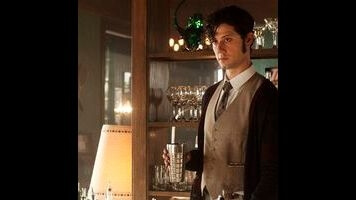It’s unfair to judge something by the way it’s marketed—books by covers, movies by trailers, and so on. What a broadcaster does to get eyes on a new series and what’s done to keep those eyes locked to the screen can be (and often are) two very different things. Syfy seems to be selling The Magicians, the new series adapted from the Lev Grossman trilogy that begins with the book of the same name, as “sexy Harry Potter.” It’s disappointing to find that, at least at first, that’s sort of what we’ve got.
That’s not all bad. The show pulls off a few magic tricks in its first few episodes, namely some brilliant choices of adaptation. One such trick: aging the characters up. What exists as a college experience on the page becomes a graduate program on screen, essentially trading awkward late adolescence for a quarter-life crisis (and making it easier to buy the mental health issues as something heavier than angst). But while Grossman’s bildungsroman uses the world of fantasy to look at some non-fantastical truths—about sex, love, isolation, exclusion, and both the resentment of and the desire to be other—the series mostly brushes lightly past the subtext and goes right for the broad brushstrokes, from anti-gravity orgasms to girls you can tell are smart based solely on their Peter Pan collars. In conjuring up a world of outcast overachievers, the show itself seems to have a problem with knowing when to stop overselling its thesis.
While Grossman’s The Magicians focuses primarily on the self-hating Quentin Coldwater (Jason Ralph), the series wisely pulls some of the action from the second book in the trilogy (The Magician King) and sets up dueling protagonists whose stories split based when one gets a yes and the other a no. Quentin and his friend and unrequited love Julia (Stella Maeve) both find they’ve suddenly stepped out of wintry New York City and into a golden summer day at Brakebills University, located in “the Bermuda Triangle Of Upstate New York,” as one character puts it. They both take an entrance exam in which the pages keep changing and about which no questions are allowed. Quentin passes, and is goaded into performing a card trick that’s one of the pilot’s more impressive visual effects. Julia fails, gets her mind wiped, and goes home.
Both Ralph and Maeve have that quality so valuable for a story like this one: the ability to look really, really confused, and to be just a little bit less interesting than the oddballs that surround them. Ralph does the bulk of the lifting in the pilot, while things get more evenly split in the follow-up, but both do fine work throughout (Maeve in particular). They’re aided by the fact that nearly all the material that has any emotional resonance centers on them. The supporting cast, while populated with more interesting characters and top-notch performers, gets tasked with escorting us through a metric ton of exposition while weighed down by the school-days stereotypes they’re expected to fulfill. There’s no room to flesh them out, since the series seems to be utterly opposed to taking its time.
A few manage to transcend the silliness. Hale Appleman plays Eliot, a droll upperclassmen who ushers Quentin through the Brakebills quad in a scene that’s a carbon copy of a similar sequence in Mean Girls. Despite the schlock he’s handed (“Psychics. You know what they are? Losers”), Appleman imbues his every scene with an overt, acerbic wit that’s fueled by just the slightest hint of artifice, as though it’s a mask that Eliot has to—and probably loves to—wear. Hannibal alumna Kacey Rohl enters Julia’s story in the second episode and immediately enlivens the series as a whole. And two members of the Brakebills staff, Dean Fogg (Rick Worthy) and Professor Sunderland (Anne Dudek) bring some nuance to their roles.
Dudek and Worthy make themselves very welcome indeed, because if there’s one thing The Magicians has in short supply, it’s nuance. That’s a problem with a story like this one, because unless the fantastical elements transcend the day-to-day, they provide precious little impact. Even moments that contain some subtlety—an early monologue by Ralph, for example, about the need to give up things that are Young Adult in order to become young adults—get lathered up, making sure that absolutely no one misses the point. It’s not enough for Quentin to be isolated at a party—he’s got to stare at the undulating, rainbow-clad ass of a young woman who then turns, gives him a derisive stare, and marches away. The show isn’t content to shove classmate Alice (Olivia Taylor Dudley, badly miscast) into thick-rimmed glasses and the aforementioned Peter Pan collars. Instead, it gives frequent reminders that she’s bookish, and a goody two-shoes, and an overachiever, and privileged, and on, and on, and on. Despite all these reminders, Alice comes across as a sketch of such a character, a cliché hollowed out and inhabited by nothing at all.
It’ll take more than an episode or two to see what The Magicians becomes when it stops trying so hard to be the dark, sexy, thoughtful, sexy, and also sexy series it so clearly wants to be. There’s a lot to like here, and plenty of potential to make the show as engrossing and sometimes devastating as the books on which it’s based. Like Fillory, the stand-in for Narnia that Quentin dreams of, such a story seems implausible, but there’s a very good chance it’s lurking out there, just waiting for someone to open the right door.








































